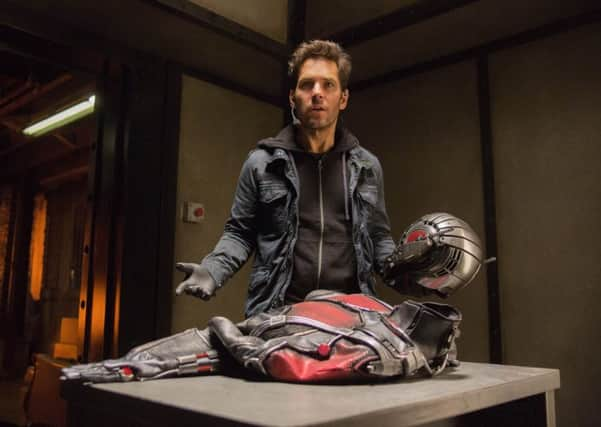Film reviews: Ant-man | True Story | The Wonders


Film of the week:
ANT-MAN (12A)
Directed by: Peyton Reed


Starring: Paul Rudd, Michael Douglas, Evangeline Lilly, Michael Peña
Star rating: ***
Now that Marvel has become a movie brand as recognisable and successful as fellow Disney-owned cohorts Pixar, mainstream pre-awareness of its back-catalogue is pretty much irrelevant. Having given hitherto B-team players like Iron Man the box-office pull of Spider-Man, transformed The Guardians of the Galaxy from an obscure sci-fi comic into a world-conquering blockbuster, and altered the entire way Hollywood thinks about franchise filmmaking with the interconnected universe of The Avengers, the studio has defiantly proved that size doesn’t really matter when it comes to a protagonist’s prominence in the pantheon of suit-wearing superheroes.
Advertisement
Hide AdThat makes Ant-Man an amusingly literal symbol of Marvel’s current filmmaking prowess. Deriving his powers from a special suit and helmet that enable him to shrink down to the size of a insect, control armies of ants and somehow – the explanation is a bit hazy – apply the proportional strength of his six-legged namesake to the human-sized world in which he operates, Ant-Man (played by Paul Rudd) is a hero who is small in stature and in status. And yet here he is with his own movie, ready to be folded into the next phase of Marvel’s masterplan to continue its ongoing dominance of the global box-office.
The good thing about Ant-Man is that The Incredible Shrinking Man-esque concept does give the film a freshness – albeit a knowing one – that makes its otherwise boilerplate origins story stand-out in the wake of all the city-levelling, world-threatening destruction that’s started to make superhero movies (and summer blockbusters in general) such a bore.
In downsizing the hero, the film downsizes the action in entertainingly weird ways, transforming a child’s bedroom, say, or an architect’s model of a building, into dynamic locations for blockbuster set-pieces that avoid calling into question the hero’s methods (by contrast The Avengers should, by rights, be serving multiple life-sentences for the manslaughter of all the bystanders probably killed during their skyscraper-destroying antics).
Such elements are holdovers from the Ant-Man movie Edgar Wright was on board to direct at one point – as are its heist-movie premise and the mentor-student relationship that exists between Rudd’s benevolent burglar Scott Lang and Hank Pym (Michael Douglas), the reclusive tech genius who recruits Lang to wear the Ant-Man suit (which he developed years earlier) so they can infiltrate his old company and prevent his successor from selling a new version of his technology to evil corporate interests intent on weaponising it.
Though Wright’s departure suggested Marvel’s own success might be limiting its desire to take creative risks, the finished film – the screenplay for which is credited to Wright and Joe Cornish, and Rudd and his writing partner Adam McKay (Anchorman) – is breezy and entertaining enough to prevent thoughts of what might have been getting in the way.
Directed by Peyton Reed (Yes Man) with a lightness of touch that builds towards an inventive payoff instead of falling back on an endless series of overblown climaxes, Ant-Man certainly makes its ridiculous concept work to its advantage.
Advertisement
Hide AdIt helps that Rudd is a likeable, down on his luck hero-in-the-making and that the film doesn’t get too hung-up on establishing the mythology in intricate detail. A nicely handled prologue quickly establishes Pym’s backstory (with Benjamin Button-style effects shaving 30 years off Douglas), and there’s great economy too in the way Rudd’s character’s criminal career is shown to have had noble intentions behind it, with revelations about its anti-corporate, Robin Hood-style nature emerging early on. The latter is something that brings Lang to the attention of Pym, though it doesn’t really impress Lang’s ex-wife (Judy Greer), who demands that he get a regular job if he wants access to the daughter he dotes on.
As it did in Avengers: Age of Ultron, this desire-for-a-regular-family-life subplot feels bolted on, an all too easy way to signify the eternal superhero struggle to have love in your life when you have a higher calling.
Advertisement
Hide AdThe film’s other weaknesses are also regular points of irritation in the Marvel canon.
There’s the obligatory crossover scene with another film in the Marvel Cinematic Universe, this time courtesy of an extended cameo from one of Captain America’s supporting characters designed, presumably, to pave the way for Ant-Man’s appearance in the next film in that series. There’s also Marvel’s embarrassing reluctance to let the women in its films have any real substance or agency beyond propelling the hero forward. Here, Evangeline Lilly essentially fulfils the Scarlett Johansson role of being an ass-kicking heroine (she plays Pym’s daughter Hope) whose evident capabilities are forever being denied or held back for some future instalment that may never materialise.
Nevertheless, Ant-Man’s strengths carry it through, particularly when it embraces its perspective-altering concept. This is a film that never loses sight of its title character, even when that character literally falls between the cracks.
True Story (15)
Directed by: Rupert Goold
Starring: Jonah Hill, James Franco, Felicity Jones, Gretchen Moll
Star rating: **
The true story behind True Story is so weird and implausible sounding that attempting to wrestle it into an accessible and tasteful format on screen doesn’t really do justice to what makes it so oddly compelling in premise form. Based on a memoir by disgraced New York Times journalist Mike Finkel (played here by Jonah Hill), the film details the strange second act of his career when he became embroiled in a murder trial following his firing from the paper of record for playing fast and loose with the truth for a 2002 story. Having retreated to his Montana home to come to terms with his newfound pariah status in his chosen profession, he learns his identity has been used by an Oregonian man accused of murdering his wife and three children. Sniffing a good story he decides to visit the prisoner and discovers a dead-eyed charmer by the name of Christian Logo (James Franco). Logo, a self-confessed fan of Finkel’s writing, makes him a deal: teach him how to write and promise not to print anything until after the trial and he’ll give him exclusive access to tell his side of the story.What follows is pretty much a two-hander between Hill and Franco, with occasional deviations to show how the developing relationship begins impacting on Finkel’s life, particularly on his relationship with his wife (Felicity Jones, doing her best in an underwritten part). The main problem here is that unlike Finkel, whose maverick status is signified early on by his ability to simultaneously hammer out copy while playing cards in the office, neither actor has much of a poker face, which robs the film of ambiguity. Hill’s performance is at least an earnest attempt to play someone wrestling with his own failings, but even this is undermined by Franco, who has no real subtlety as a performer, cursed with a kind of smug self-awareness brought on by his own ubiquitous desire to be regarded as a modern day polymath. His sly grins and look-at-me intensity take you out of the movie almost from the moment he appears, something not helped by debut writer/director Rupert Goold playing his hand too early.
Clearly giddy at the irony-drenched nature of a film about a journalist too blinded by the bigger story to see the facts, he draws attention to the film’s winking nature without subverting our expectations enough for anything that follows to be a surprise. For all the big and intriguing themes the film subsequently pays lip service to, there’s no disguising the fact that this is a fairly dull and suspense-free true crime drama.
New releases
Salt of the Earth (12A)
Directed by: Wim Wenders, Juliano Ribeiro Salgado
Star rating: ****
Advertisement
Hide Ad“Having a photographer in front of your camera is very different from filming anybody else,” says Wim Wenders, in this documentary about the Brazillian photojournalist Sebastião Salgado. “He will not act like himself,” he continues. “By profession he acts in response, using his weapon of choice.”
This observation may sound like a tacit admission that a documentary is an inadequate format to capture the essence of the man behind some of the most startling images of the past 40 years. But in shooting Salgado shooting others, the contrary proves to be the case: what Salgado reveals about himself through his work is thoroughly illuminating, something underscored by Wenders working with Salgado’s son, Juliano, a documentary maker in his own right who has accompanied his father on multiple expeditions in an effort to better understand the man he never got to know properly as a child. The affection between the two is palpable, as is Salgado’s humanism in pictures that are simultaneously epic and intimate, conveying this former economist’s deep understanding of the market forces driving the world and their effect on the most vulnerable and exploited.
13 Minutes (15)
Directed by: Oliver Hirschbiegel
Advertisement
Hide AdStarring: Christian Friedel, Katharina Schüttler, Johann von Bülow
Star rating: ***
Downfall director Oliver Hirschbiegel had his own downfall with his last film Diana, so it’s perhaps unsurprising he’d want to return to the territory of his biggest critical success. This dramatisation of a foiled 1939 plot to kill Hitler stars Christian Friedel as Georg Elser, a German labourer who constructed and planted a bomb to kill the Führer during a speech in Munich. The film kicks off with the assassination plot itself (the title is a reference to the narrow margin by which Hitler’s death was averted) before jumping back and forth between Elser’s subsequent arrest and torture by the Gestapo (who refused to believe he acted alone), and flashbacks to the circumstances surrounding his radicalisation. Though well acted, the latter aspect of the film sadly isn’t as compellingly rendered as the battle of wills that erupts between Elser and his Nazi interrogators.
The Wonders (15)
Directed by: Alice Rohrwacher
Starring: Maria Alexandra Lungu, Alba Rohrwacher, Sam Louwck, Monica Bellucci
Star rating: ****
Stripping tourist brochure romanticism from its portrayal of Tuscan artisanal life, this Cannes winner uses a farming family’s slide into financial ruin to make subtly astute points about the incompatibility of alternative lifestyles with modern sensibilities. If that sounds heavy, writer/director Alice Rohrwacher (Corpo Celeste) avoids polemics by framing the story as a coming-of-age tale revolving around the eldest daughter (Maria Alexandra Lungu) of dropout parents whose apiary is struggling to supply them with the income required to keep a roof over their heads. Telling the story from the daughter’s point of view, Rohrwacher creates a moving, unsentimental portrait of a dying way of life.
The Gallows (15)
Directed by: Travis Cluff, Chris Lofin
Starring: Reese Mishler, Ryan Shoos, Pfiefer Brown, Cassidy Gifford
Star rating: *
A hangman’s noose is the weapon of choice for the malevolent ghost terrorising high school students in this latest found footage horror film – appropriate, really, given the cliché-ridden, scare-free results choke what remaining life there is left out of the cheapo mock-doc format. Thoroughly obnoxious characters and a nonsensical premise only reinforce the film’s dangling, lifeless quality.